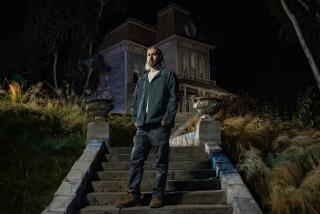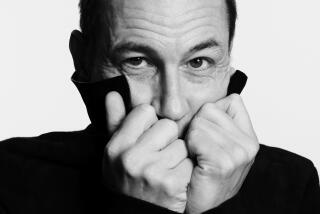A matinee idol finds his inner mean streak
- Share via
Thanks to his graceful ease playing leading men in romantic comedies, Morris Chestnut has developed into a matinee idol among African American women. During the production of the 1999 film “The Best Man,” the makeup artists nicknamed him “Dark Gable” -- and this was before his roles in “The Brothers” and “Two Can Play That Game,” both of which came out last year.
But the handsome 33-year-old Cerritos native actually brings to mind Billy Dee Williams, who achieved heartthrob status in the 1970s, more than Clark Gable. Chestnut, the happily married father of two young children, says being cast as the romantic leading man has been a blessing and a curse. “There have been roles I wouldn’t be considered for because producers think I wouldn’t be edgy enough,” Chestnut explains during a recent interview. “They don’t see me as having a mean streak within me, so they don’t give me an opportunity.”
For the record:
12:00 a.m. Nov. 21, 2002 For The Record
Los Angeles Times Thursday November 21, 2002 Home Edition Main News Part A Page 2 National Desk 9 inches; 347 words Type of Material: Correction
Film opening -- An article about actor Morris Chestnut in Tuesday’s Calendar mistakenly referred to his new film, “Half Past Dead,” as opening that day. It opened on Friday.
Until now.
Chestnut gets the opportunity to play his first bad guy in the new Steven Seagal action-thriller, “Half Past Dead,” which opens today. With his shaved head and “Matrix”-style long coat, Chestnut plays Donny, a disgruntled prison official who, with a band of cutthroats, attempts to kidnap a death row prisoner (Bruce Weitz) who has hidden $200 million worth of gold. Seagal plays an FBI agent deep undercover as a prisoner.
It was Clint Culpepper, the head of Screen Gems, who tapped Chestnut for the role of Donny. Culpepper is a real champion of Chestnut, whom he has cast in four Screen Gems productions.
“I am always looking for stuff for him,” Culpepper says. “I wanted him to play edgy because he is thought of as a kind of romantic comedian. I know that ultimately he wants to do action. I thought this would be a challenge for him as an actor and would not only help him as an actor but show a different side.”
The film’s writer-director, Don Michael Paul, acknowledges he wrote the part for a white actor. But, he says, “I wanted to somehow make this movie a little bit more accessible to a moviegoing generation that really isn’t aware of Steven Seagal.”
Chestnut underplays Donny, bringing a cold, quiet, menacing quality to the character. “That’s how I saw him,” Chestnut says. “But I was a little concerned because Steven kind of underplays a lot of his roles, and we are not in a lot of scenes together, so I didn’t want to the movie to seem it was me underplaying and then him underplaying.”
Paul says Chestnut embraced his role as the movie’s chief villain. “He did exactly what he should have done, which is not to bang the nail on the head,” says the director. “It would have been really easy
“Half Past Dead” was a difficult shoot, Chestnut says.
“We were in Germany and at first we were losing days because of the communication barrier,” he says. Additionally, the real prison location in Berlin was dirty and depressing. Chestnut also found the people in Germany not to be very warm. “Just walking up and down the streets, no one is really smiling, and when you are in that cold of a prison and so filthy, it is just kind of a weird feeling.”
Chestnut is hobbling around in crutches in his hotel suite in Beverly Hills, having torn his Achilles tendon a month earlier during a basketball game. “I had surgery the week after the injury,” he explains. “I was in a splint and two weeks ago I got this cast, and tomorrow I get another cast. I can’t start playing basketball again for two or three months. This is the first time I have ever had a cast on or crutches.”
Throughout high school, Chestnut played basketball and football, with the latter being his first love.
“I wanted a football scholarship, but I told myself if I didn’t get a football scholarship I wouldn’t try to walk on for tryouts because there are too many politics involved.”
When the scholarship didn’t happen, Chestnut enrolled at Long Beach City College undecided about what to do with his life. “I was a bank teller after I graduated from high school, so I thought, ‘I can be a bank teller or a bank manager.’ ”
He caught the acting bug when a friend from English class invited Chestnut to see him in a school play.
“It was like, “Wow,’ ” Chestnut recalls. “I looked around and the girl I was with was checking him out. So the next semester I took an acting 101 class. I liked it and pursued it.”
He got his first big break playing the role of doomed Ricky opposite Ice Cube and Cuba Gooding Jr. in John Singleton’s acclaimed 1991 film, “Boyz N the Hood.” Though Chestnut was thrilled with the film’s success, he was green behind the ears when it came to his career.
“I didn’t have confidence in what I was doing,” he says. “All of a sudden I went from someone who was not recognizable to I would be walking in malls and people were calling me by the character.”
Instead of trying to build a screen career on the momentum of “Boyz,” Chestnut says he made a big mistake when he decided to do the short-lived NBC sitcom “Open All Night.”
“I didn’t know anything about the industry and how to handle myself,” Chestnut says. But over the past decade, he’s learned. “I persevered and I’m still here.”
More to Read
Only good movies
Get the Indie Focus newsletter, Mark Olsen's weekly guide to the world of cinema.
You may occasionally receive promotional content from the Los Angeles Times.











